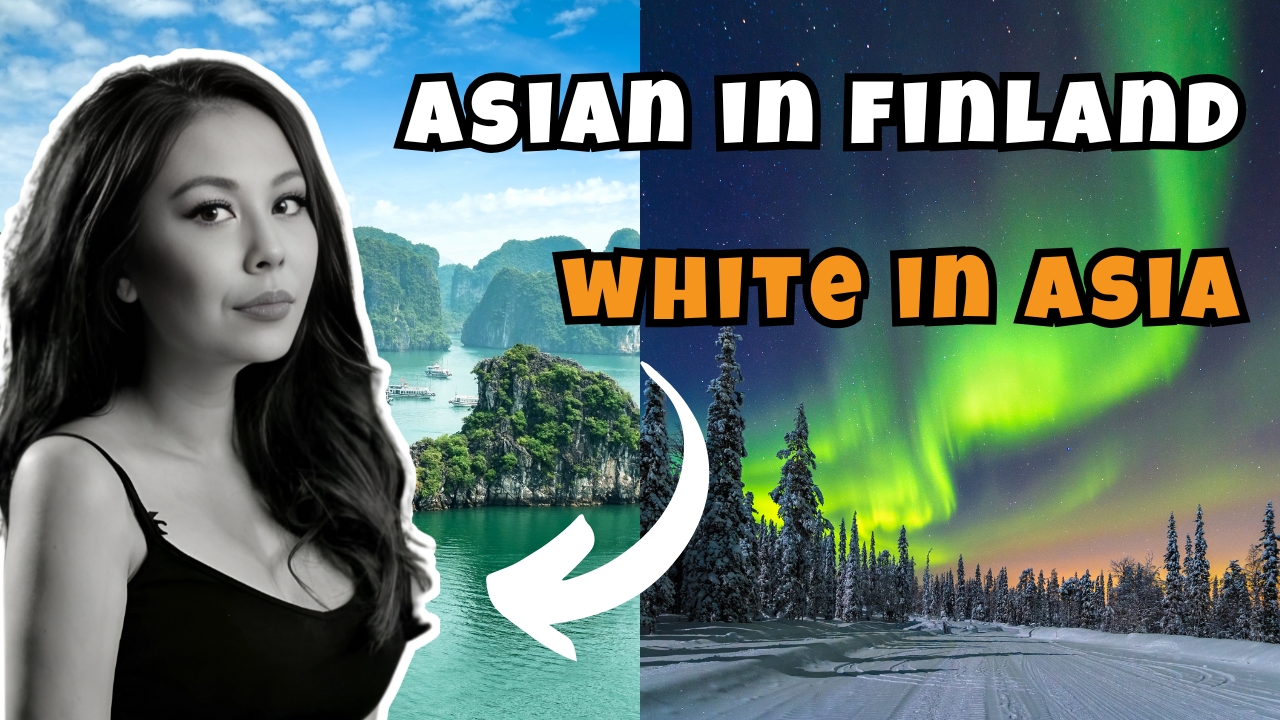I’m Niall Mackay, your host of A Vietnam Podcast and I’m also an expat who fell in love with Vietnam back in 2015. What was meant to be a short holiday has turned into nearly a decade of living here, with no plans to leave anytime soon.
In A Vietnam Podcast I’ve shared many similar stories of people like me who came to Vietnam for a short visit but ended up staying.
My guest today, Linda Beck, has a unique background. She is half Swedish, and half Vietnamese, grew up in Finland, and speaks four languages fluently: English, Vietnamese, Finnish, and Swedish.
Linda offers a rare perspective, navigating the world as someone perceived as Asian in the West and white in Asia. Her dual lens allows her to understand cultural viewpoints from both sides.
Background and Childhood
Linda shared her story of growing up in rural Finland. Her father was Swedish, and her mother was Vietnamese from the North. Her childhood was spent on a farm with sheep, pigs, chickens, and cows. As a child, she wasn’t very aware of being different, but school changed that. She was bullied for being Asian and struggled to fit in. Like many teenagers, she wanted to blend in and even dyed her hair blonde to look more Western.
After interviewing many guests with similar backgrounds, I noticed a common theme in their experiences. Growing up, they often felt like the odd one out—the only child in their class who looked different. Their main goal was to fit in, so they rejected learning Vietnamese and didn’t have a positive impression of their home country. Despite this, their parents insisted they stay connected to Vietnam, teaching them the language and culture. Surprisingly, as adults, they often made the decision to return to Vietnam, often to the astonishment of their family and friends.
Listen to the same story: Vietnamese Roots, German Beginnings – Embraces Your Identity with Trang Nguyen
Linda’s mother had an incredible story of resilience. She fled Vietnam as a refugee, spending ten years in a camp in China. There, she met Linda’s father, who worked with organizations like Amnesty International. Eventually, they moved to Finland, where Linda and her brother were born. Linda admired her mother’s strength and bravery, especially in adapting to a new country without knowing the language. Her mother believed that language was one of the greatest gifts a parent could give their child, which explained why she pushed Linda to learn so much.
Language
Her mother, however, made sure Linda learned Vietnamese. Every day after school, Linda spent hours reading and writing Vietnamese, and she attended extra classes on Saturdays. Even in the Vietnamese community in Finland, Linda felt different because she was Northern Vietnamese and mixed-race, while most others were Southern Vietnamese. Despite her resistance at the time, her mother told her she’d thank her later. Now, Linda was grateful because she could speak, read, and write Vietnamese fluently, even with a stronger Northern accent than her mother.
As Linda grew older, she started forgetting some of the languages she spoke, like Swedish, because she rarely used it. She joked about how her Swedish sounded “broken” to friends back home. She made an effort to stay connected with Finnish and Swedish people in Vietnam but admitted that there weren’t many around her age. Living abroad had also made her appreciate Finnish and Swedish culture more, especially the foods she grew up with, like meatballs and reindeer meat.
Niall and Linda also discussed how language could affect a person’s personality and behavior. Linda explained the idea of “code-switching”—adapting language, mannerisms, and even tone depending on the culture or people she interacted with. She found herself switching accents or speech patterns depending on whether she was speaking English, Swedish, or Vietnamese. Each language brought out a different side of her personality.
Coming Back To Vietnam
When I asked Linda why she came back to Vietnam, she explained how her mom instilled a strong connection to her heritage. Growing up, her mom brought her to Vietnam every two years, dressing her in traditional clothes and taking her to temples. This regular exposure created a deep bond with the country. Her mom believed that Linda’s biracial identity and fluency in multiple languages would open unique opportunities in Vietnam.
“I came for three months, and now it’s been ten years,” she said
Culture Shock and Reverse Culture Shock
She described how the city she came from had only 200,000 people, and the capital, Helsinki, felt massive to her at the time. When she arrived in Vietnam, the sheer size and density of the population overwhelmed her. “I came from a very Finnish mindset,” she explained.
“We value personal space. You don’t talk to strangers or even look at them. I’d rather stand in the rain than sit next to someone on a bus.”
The crowded, tactile culture of Vietnam took some getting used to, but over time, Linda said she grew to love it. “Now I’ve become that person who talks to strangers,” she joked.
Have you ever heard of reverse culture shock? Sounds strange, right? It’s about when you get used to living in another country, and you feel strange and shocked when you come back to your homeland. Linda had the same experience too when she felt at home in Vietnam more than in Finland now.
The crowded, lively culture of Vietnam had transformed her. “Now I’ve become that person who talks to strangers,” she joked. In contrast, Finland felt quiet, structured, and almost too orderly. She appreciated how “everything works” in Finland, from public transport to punctual deliveries, but admitted it no longer felt like home. “I love visiting, but I don’t think I could ever move back permanently,” she said, noting that while life there is calm and predictable, it lacks the vibrancy she’s grown to love in Vietnam.
You may interested: Jason Pham: Crafting Saigon’s Best Cocktails and Building Community
Dating and Marriage: Cultural Differences
We talked about how cultural differences shape experiences in Vietnam, focusing on dating, marriage, and friendships. Dating, in particular, has evolved significantly with apps and social media. Linda noted that stereotypes persist, like the idea that Western men prefer Vietnamese women, leaving fewer options for Western women. She shared how some assume Vietnamese women are submissive, but she challenged this as outdated, highlighting their strength and independence.
We also touched on relationship dynamics. Many expats arrive with short-term plans, which complicates dating. For some, cultural differences, language barriers, and differing expectations cause challenges. Niall mentioned that while stereotypes like “bag a foreigner” linger, he feels they’re far less relevant today.
Friendships among expats in Vietnam are unique because they form intentionally. Linda reflected on how expat life brings together people who wouldn’t normally cross paths. She described it as “trauma bonding” over shared challenges, creating deep connections. “Back home, friendships often come from proximity, like school or neighborhood,” she explained. “Here, you choose your friends, and that makes those bonds stronger.”
Overall, Vietnam fosters relationships and friendships that might never happen elsewhere, offering a rich mix of challenges and rewards.
Animal Treatment
Linda shared her deep passion for animals and volunteering, which began with her parents’ influence. She treats her dogs like children—spoiling them with filtered water, sleeping under the covers, and constant care. She admitted that some people find her treatment over-the-top, but she embraces it.
When discussing animal treatment in Vietnam, Linda acknowledged the stark cultural differences. While pets are increasingly seen as family members in Vietnam, the traditional view of dogs as guard animals or outdoor pets persists. Linda has rescued dogs from dire situations, including meat markets, which was a harrowing experience. She described how dogs are mistreated, from being chained up in cages with no floors to being subjected to inhumane practices in the meat trade.
She believes education and alternative job opportunities for those in the dog meat trade could make a difference. She’s also noticed progress, such as the closure of some dog meat restaurants and a shift in how pets are viewed, particularly in urban areas like Saigon.
We also talked about the growing trend of pet shops in Vietnam selling high-priced pedigree dogs. While Linda advocates for “adopt, don’t shop,” she understands the appeal of specific breeds. However, she pointed out that many dogs sold in these shops come with health issues despite official paperwork.
Conclusion
Linda’s unique perspective as someone who bridges multiple cultures offered valuable insights into the challenges and rewards of embracing her Vietnamese heritage. From her deep connection to animals and her passion for rescue work to her reflections on the evolving culture of Vietnam, Linda’s story is one of resilience, adaptability, and love for her roots.
If you want more stories, insights and experiences about Vietnam, follow us for more episodes.


13 thoughts on “Cultivating Compassion: A Journey Through Cultural Identity with Linda Beck”
Comments are closed.